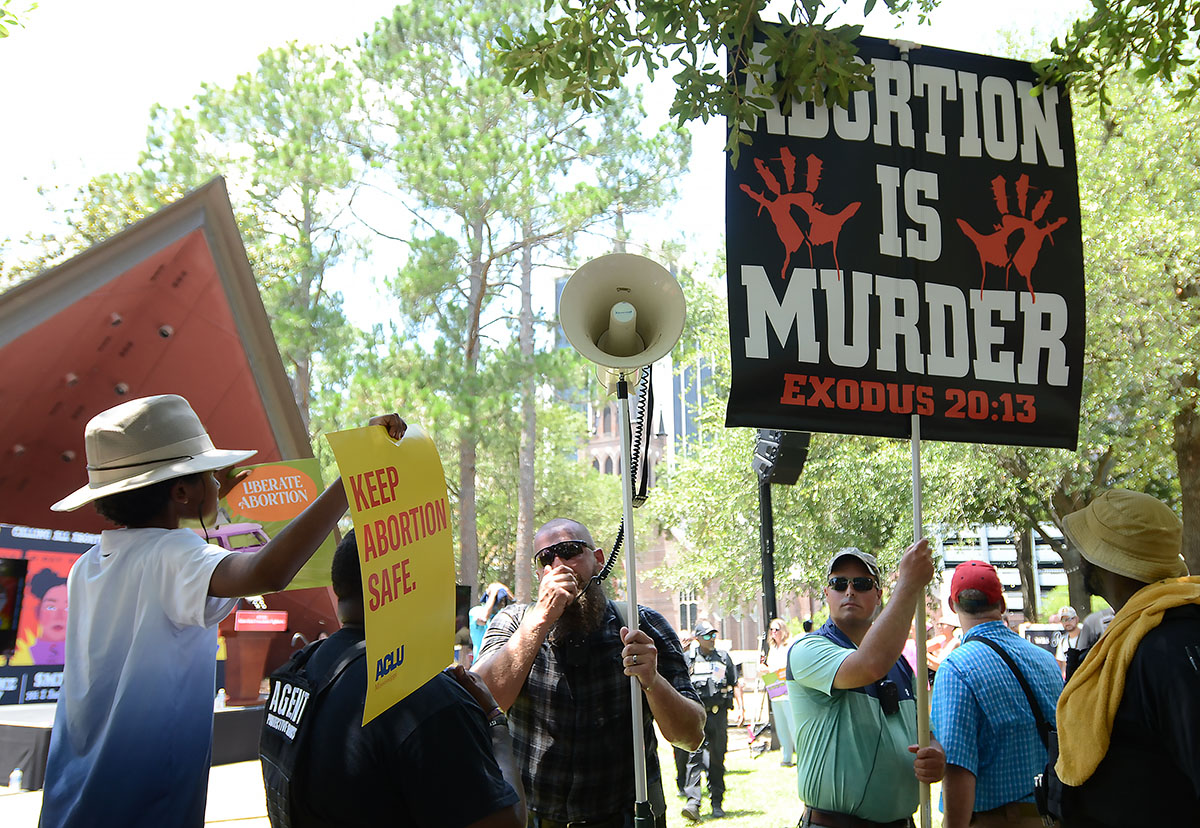Mississippi Today
Republicans vowed a robust post-Roe agenda. Here’s how it’s going.
Republicans vowed a robust post-Roe agenda. Here’s how it’s going.
After leading the charge to overturn Roe v. Wade and outlaw abortion in Mississippi, Republican leaders promised to address the inevitable fallout and prioritize support to pregnant women and babies.
Yet many bills filed this legislative session to strengthen the social safety net, fund child care for low-income parents and increase access to resources like contraceptives have all died before lawmakers had a chance to vote on them.
While debate rages over the most visible piece of legislation to improve outcomes for expectant moms, postpartum Medicaid coverage, the help pledged by Mississippi’s politicians in the wake of Roe extends far beyond health care. It considers financial and economic stability, improved public assistance policies, family stabilization, streamlined adoption processes and more.
Gov. Tate Reeves has called this an “ambitious new pro-life agenda.” Mississippi Attorney General Lynn Fitch, who historically defended Mississippi’s abortion ban in Dobbs v. Jackson Women’s Health Organization before the U.S. Supreme Court, described her mission to “support the whole life and the whole woman.” Speaker of the House Philip Gunn called it “an opportunity to lead the nation in protecting, promoting, and supporting life.”
The programs and initiatives, many of them at the discretion of the Legislature, aim to ensure that women who feel unprepared to become mothers are supported and have access to resources to successfully care for their child. They also try to address the reality that these unwanted or unplanned pregnancies and births could result in more children in the state’s plagued foster care system, without homes or families.
For Republicans, these goals are met by funding private pregnancy centers, typically faith-based organizations focused on anti-abortion advocacy as opposed to professional social work; cracking down on child support enforcement; and making it easier for people who do not want to be parents to give up their children for adoption.
More Democratic lawmakers and family advocates believe these objectives would be better accomplished by expanding Medicaid; reforming the state’s welfare agency; increasing workforce development and workplace protections for women; and funding more child care vouchers for low-income parents. Most of this legislation died without a vote, including more than 15 bills introduced to expand Medicaid.
There is one niche but impactful policy change that both Reeves and advocates for low-income families support: to remove the child support enforcement requirement within the child care voucher program. Mississippi’s Child Care Payment Program, which provides child care vouchers to low-income working families, is funded by the annual federal Child Care Development Block Grant (CCDBG) and administered by the Mississippi Department of Human Services. Mississippi’s child care block grant was about $94 million in 2023.
The Legislature has not proposed legislation to do this, but legal experts say that because the requirement is not mandated by state or federal statute, Mississippi Department of Human Services could make the rule change on its own.
Reeves has also thrown his support behind new child care tax credits, increased corporate tax credits for crisis pregnancy centers and a special partnership with an adoption agency called Lifeline Children’s Services.
“We must be willing to prove that being pro-life is not simply being anti-abortion,” Reeves said on the Paul Gallo Show on conservative talk radio network SuperTalk on Jan. 11. “Because of that we’ve initiated a very aggressive new pro-life agenda in our state. We’ve proposed establishing child tax credits for child care, increasing the first of its kind across America pregnancy resource center tax credit. We want to partner with Lifeline Children’s Services to ensure that we’re helping the moms and newborn babies.”
Mississippi Today compiled and analyzed more than 60 pieces of legislation that could satisfy politicians’ stated post-Roe agenda. Twenty-six were still alive by early February after the first round of legislative deadlines for general bills.
Access to resources
Republicans are looking to crisis pregnancy centers as the primary support system for women facing an unplanned pregnancy.
House Bill 468, introduced by Gunn, R-Clinton, would increase an existing tax credit for corporations who donate to pregnancy centers from an annual aggregate total of $3.5 million to $10 million. While lawmakers have not taken action on the bill, it remains alive because it is considered a revenue bill, which lawmakers don’t have to take up until a Feb. 22 deadline.
The tax credit, which Gov. Reeves supports, was initially created by legislation last year.
Only centers that align themselves with the statewide organization Choose Life Mississippi, run by ardent anti-abortion activist Terri Herring, are eligible for the tax credit. But the companies that benefit from the program are a mystery – the Mississippi Department of Revenue does not release a list of those that claimed the credit.
Reeves also supports direct taxpayer contributions to these centers.
House Bill 983, which died in committee, would have created the Pregnancy Resources Grant Program under the Mississippi Department of Child Protection Services to award competitive grants to crisis pregnancy centers. A separate appropriations bill to fund the CPS grant program, House Bill 1546, is still alive.
Senate Bill 2781 would create the Mississippi Access to Maternal Assistance Program within the Mississippi State Department of Health. The program would serve as a resource hub, coordinating and promoting information about services for expectant mothers, such as adoption assistance, child care, domestic abuse protection, early intervention, food, clothing, job training and placement, paternity, parenting skills, prenatal and postpartum care. That bill is still alive.
Other bills to actually pump resources through the health department, instead of just coordinating them, died. House Bill 1085 and House Bill 506 would have required a nurse practitioner to be present at each of the county health departments weekly to provide contraceptive supplies, either for free or on a sliding fee scale. House Bill 1263 would have required county health departments to provide free menstrual hygiene products. House Bill 1372 would have added a line item to the health department’s budget for funding to the Child Advocacy Centers, community-based resource centers for children and mothers experiencing abuse, which have recently faced large budget cuts. None of these bills received noticeable attention.
Economic health
Opponents to legal abortion have also acknowledged the need to improve the economic position of mothers, as well as people who choose to adopt.
One policy that national advocates have recommended for years – a state Earned Income Tax Credit – would provide an income boost to low-income working Mississippians. State Auditor Shad White, who investigated the welfare scandal, supports the tax credit and said the state could use welfare funds to implement the program at no new cost to the state.
“Economists agree that EITCs are one of the best ways to improve the economy and help working people,” White wrote in a column last year. “The EITC would directly attack a critical problem facing the state. More people working means stronger families, more tax revenue, and a better economy. Policymakers should put money into the hands of working people and get Mississippi moving forward.”
The Mississippi Legislature has routinely ignored any legislation to start offering a state Earned Income Tax Credit, which models an existing tax credit on the federal side.
House Bill 321 and Senate Bill 2897, both authored by Democrats, are the two Earned Income Tax Credit bills before the Legislature this year.
Other bills introduced by Republicans to create tax credits for child care and adoption expenses might have an easier road ahead this session.
House Bill 130, House Bill 322 and Senate Bill 2898 would provide a new income tax credit to parents for child care expenses.
“As long as we have an income tax, we should use it to incentivize the responsible raising of children,” Reeves wrote in his budget recommendation. “These policy changes are tangible ways to reduce the costs of raising a family in America today.”
Similarly, House Bill 1268 and Senate Bill 2696, which passed the Senate, would increase tax credits for adoptive parents to pay for adoption-related expenses.
Fitch supports House Bill 505 and Senate Bill 2335, which incentivize employers to offer additional benefits to parents. House Bill 505 provides tax credits to employers who provide maternity and paternity leave for its employees and Senate Bill 2335 provides tax credits to employers who pay for their employees’ child care.
All of these are considered revenue bills, so they are still alive, awaiting the later deadline.
Two bills to strengthen women’s standing in the workforce – the Mississippi Pregnant Workers Fairness Act and the Mississippi Paid Family Leave Act – died without consideration.
House Bill 1361 would have prohibited employers from discriminating against women because they are pregnant, and Senate Bill 2286 would have required employers with more than 50 employees to offer 12 weeks of paid leave for childbirth.
Mississippi has among the lowest wages and median household income of any state in the country. Minimum wage in the state, which follows the federal minimum wage of $7.25, has not increased since 2009.
Seven bills to increase the minimum wage – House Bill 96, House Bill 323, House Bill 583, House Bill 810, Senate Bill 2284, Senate Bill 2288 and Senate Bill 2439 – died without a vote.
Welfare policies
Following revelations about widespread abuse within Mississippi’s Temporary Assistance for Needy Families (TANF) program, or welfare, Democratic lawmakers filed several reforms to the Mississippi Department of Human Services.
Currently, Mississippi has over $100 million in TANF funds sitting idle. The department has not answered repeated questions from Mississippi Today about how it plans to use the reserve.
- House Bill 463, House Bill 774, Senate Bill 2794 would have moved tens of millions of the state’s annual TANF block grant to supplement the state’s child care voucher program, potentially providing child care to thousands of working parents who might not have it otherwise. The federal government allows states to use 30% of its block grant this way.
- House Bill 1431, a perennial bill from Rep. Omeria Scott, D-Laurel, would have required the state to use unspent TANF funds on tuition and expenses for nursing students, simultaneously providing workforce training to low-income Mississippians and addressing the state’s nursing shortage.
- House Bill 612 would have required the welfare agency to provide transportation and child care to TANF recipients, to assist them with completing the application process and participating in the required work program.
- House Bill 613 would have limited TANF programs to serve people below 200% of the federal poverty line.
- House Bill 502 would have increased the monthly TANF cash assistance by more than $200.
- House Bill 970 would have prevented the state from using TANF funds for college scholarships to families who are not receiving TANF benefits. Historically, the state has reported its annual appropriations to the state’s scholarship programs as TANF spending in order to match the federal grant and pull down the funding. The effect of this is that money that should be going towards anti-poverty programs is actually being used to benefit middle-class families, Mississippi Today first reported in 2019.
- House Bill 971 would have loosened eligibility for TANF, removing the upfront job search requirement, which presents significant barriers to applicants.
- Senate Bill 2331 would have removed the requirement that single moms sue their child’s father for child support – the same restriction Reeves supports dismantling in the child care voucher program – in order to qualify for TANF or food assistance through the Supplemental Nutrition Assistance Program.
- Senate Bill 2806 would have removed the drug testing requirement from the TANF program.
Though all of these bills died without consideration, Democratic lawmakers took the opportunity to discuss these policies when a repealer bill for the Mississippi Department of Human Services – standard legislation that comes up every few years to extend the life of an agency – reached the Senate floor Tuesday.
While presenting his amendment to the repealer bill, Sen. David Blount, D-Jackson, criticized MDHS for using $30 million in TANF funds each year to supplement the Mississippi Department of Child Protection Services, which he argued should be funded with state appropriations. This is just one example of how the state fails to use these dollars in the most effective way to fight poverty.
“It’s all legal but it’s wrong,” Blount said. “And we need to fix it.”
Blount’s amendment would have moved $30 million in TANF funds to the child care voucher program. Sen. Derrick Simmons, D-Greenville, also introduced an amendment to remove the drug testing requirement for TANF applicants. Sen. Rod Hickman, D-Macon, noted the extremely low approval rate of TANF applications – as low as 2% in some years – when he introduced a bill that prohibits MDHS from denying assistance to families under 130% of the federal poverty level.
Republican senators killed all three amendments.
“The question posed by the amendments today is: In response to the biggest public scandal involving a state agency in the history of this state, what did the Legislature do? The answer expressed today is nothing. We do nothing. We make no changes,” Blount said. “That attitude is the reason we got in this problem in the first place, because it is the disregard for the politically powerless.”
Mississippi Department of Human Services Director Bob Anderson has asked the Legislature to make one important reform to the department to ensure it runs smoothly so that it can serve all eligible applicants: Remove the bureaucratic red tape created by the Medicaid and Human Services Transparency and Fraud Prevention Act, dubbed the HOPE Act, passed in 2017.
A bill this session to do this, House Bill 503, died.
Conversely, Republican lawmakers have filed bills to increase restrictions or make it harder still for low-income families to access public assistance.
Sen. Angela Hill, R-Picayune, introduced a bill to require the welfare department to include photo identification on Electronic Benefit Transfer (known as “EBT”) cards — the cards recipients use to spend their Supplemental Nutrition Assistance Program (SNAP), or food stamps, benefits. The bill, which died, would have prevented more than two people in the family from being able to use the card.
Two other dead bills, filed by Sen. Melanie Sojourner, R-Natchez, would have prohibited TANF funds from going to people convicted of several felonies and require TANF recipients to participate in community services.
Child support & fatherhood
“The Republican Party Platform affirms ‘our moral obligation to assist, rather than penalize, women who face an unplanned pregnancy,” reads a 2022 column in the Hill co-authored by Fitch. “At the urging of then-Treasurer Lynn Fitch, the platform that stands today supports ‘legislation that requires financial responsibility for the child be equally borne by both the mother and father.’”
The strict ban on abortion has brought renewed attention to the state’s long-troubled child support program, which provides legal services to help separated custodial parents secure court orders against the noncustodial parent for monthly child support payments. Many of the single moms in the child support program are forced into the system as a condition for receiving public assistance from the state.
The enforcement side of the program, which is run by a private contractor, then helps enforce the order by locating the noncustodial parent, establishing paternity if necessary, garnishing wages, intercepting tax refunds, and in extreme cases, suspending driver’s licenses or filing criminal charges in the case of unpaid support.
(The child support privatization contract with Young Williams has come under scrutiny in recent years for failing to require that the contractor meet certain performance-based metrics, something MDHS says it solved in its existing contract. House Bill 177 would have eliminated the contract and brought the program back in-house. It died.)
Lawmakers filed several bills to tweak the child support program to, as Fitch said, “require fathers carry their equal share of the financial needs of childbearing and child-caring.”
- House Bill 6, House Bill 1046, House Bill 1083, and Senate Bill 2385 would set up procedures to allow the child support enforcement program to intercept gambling winnings for unpaid child support.
- House Bill 1114 would increase the cap of how much a person’s income goes towards child support. Currently, a person with five or more children under support orders must pay 26% of their income in child support payments. The bill would revise the law so that a person with six or more children pays 30% of their income. Reeves publicly supports this policy change.
- House Bill 320 and House Bill 1117 would revise the law so that monthly child support payments begin when a woman becomes pregnant, instead of after birth. HB 1117 would also include prenatal and post-natal expenses as part of the order.
- House Bill 1183 would require Mississippi Department of Human Services to publish the names and photos of people in child support arrearage.
All of these bills died.
The only bills to crack down on child support that remain alive are Senate Bill 2634, filed by Sen. Joey Fililngane, R-Sumrall, on behalf of Fitch’s office, and House Bill 1490 by Speaker Gunn.
Fillingane’s bill increases the statute of limitations for criminal charges against a person who refuses to pay child support. Currently, a person can be charged with desertion of a child if they are found to have wilfully neglected or refused to pay child support while the child is under 18. The bill would increase that age to 21 and also allow for charges to be pursued for three years after the child turns 21.
A nearly identical bill in the House, House Bill 1112, died.
Gunn’s bill requires the Wildlife, Fisheries and Parks to suspend the license of any person who has not paid child support.
“For too many families, regular and reliable child support payments can be the difference between steady meals and going hungry,” Fitch wrote in her most recent column for World News Group last week. “As four out of five custodial parents are women, too often this falls heavily on the mother. Fathers simply must be held equally responsible for their children financially. Women have borne this burden alone for too long.
Legislation that takes a more punitive approach to child support collections – which some advocates warn may lead to the criminalization of poverty – appears to reverse the national trend.
In 2016, the federal Office of Child Support Enforcement implemented a rule change that required states to enact safe guards so that before a parent is jailed for unpaid child support, there must be evidence that the parent has the funds and is willfully refusing to pay. The federal government gave states until 2022 to comply. The rule in part helps to ensure that states are following the 2011 U.S. Supreme Court decision in Turner v. Rogers, which said states must determine whether a parent is able to pay the ordered child support before incarcerating them for nonpayment.
The 2016 rule also prohibits states from allowing child support debts to accrue while a parent is behind bars, but the practice still continues today. As a result of not complying, human services director Bob Anderson told lawmakers that Mississippi is at risk of losing its federal match for the operation of the child support enforcement program – about 66% of the program’s budget.
To deal with this, Sen. Brice Wiggins, R-Pascagoula, introduced Senate Bill 2082, which suspends child support arrears from accruing when a person is in prison or involuntarily institutionalized for longer than 180 days. House Bill 1215 would do the same thing. Both are still alive.
Another bill that would have offered leniency to people dinged for not paying child support is Senate Bill 2218, introduced by Sen. Hill, which would have provided temporary driver’s licenses for the purpose of employment and worship to people whose licenses were suspended due to unpaid child support. That bill died.
National child support experts have long acknowledged that a punitive approach to child support collections is not necessarily the most beneficial for families. If a father loses his license or goes to jail, for example, he might lose his job, only making it less likely he’ll be able to make the monthly payment.
“It’s a very complex question when you’re trying to force a parent to do what he or she ought to do anyway. And you can’t legislate everything, but we try to do the best we can,” said Filingane. “Let’s take the example of the driver’s license being suspended. Well, then, if you’re gonna follow the law, and you no longer have a driver’s license, how do you expect that person to get to their job to earn the money to then turn around and pay the child support? … There’s all these sometimes unintended consequences that happen.”
“And when you criminalize behavior and you end up throwing them in jail, sometimes it does the trick,” he continued. “It’s fascinating that sometimes the person who swears up and down that he or she doesn’t have a hundred bucks to their name and can’t pay it cause they just don’t have it, they end up in jail and less than eight hours later it’s paid in full.”
The state’s efforts to either force or incentivize fathers to participate in child rearing extend beyond the child support program. But information about the efficacy of those efforts is lacking.
Every year for the last several years, Mississippi has spent anywhere from $9 million to $39 million in TANF funds on grants to “Fatherhood and Two Parent Family Formation” programs, according to federal reports, but the department does not provide much information about what those programs entail, nor does it gather any records to show what outcomes the programs achieved.
House Bill 1146, authored by Rep. Becky Currie, R-Brookhaven – the lawmaker who introduced the abortion ban that overturned Roe v. Wade – would have created the “Mississippi Fatherhood Initiative Fund” to distribute grants to local organizations providing parenting resources to fathers. The bill died.
Auditor White has placed a heavy focus on “fatherlessness” in recent months, releasing a report that aimed to demonstrate the cost of one-parent households on Mississippi taxpayers. One example: the report estimates that 50% of the state’s prison population are men who come from “fatherless” homes, and the state spends $180 million annually to incarcerate them. (A bill to provide workforce training to inmates, House Bill 640, died).
The report lays out the purported problem – positioning “fatherlessness” as the root cause of societal ills associated with poverty, as opposed to the other way around – but the proposed solutions are sparse.
White makes one recommendation: expand the JROTC military program in high schools across the state.
“Countless studies prove our communities and families — along with the average taxpayer — would benefit from strong, engaged fathers and father figures in the lives of Mississippi’s children,” the report reads. “One program interrupting the cycle of fatherlessness is the Junior Reserve Officer’s Training Corps (JROTC).”
White points to the 100% graduation rate of students in the program. The cost of expanding the program to all high schools is $185 million, according to White’s separate 2020 report on JROTC. There has been no legislation introduced this session to do this.
But there have been bills – House Bill 1360, House Bill 1413, House Bill 1414 and House Bill 1419 – to implement various high school dropout prevention and academic performance improvement programs in struggling districts. They all died without consideration.
Reeves supports at least one initiative in this arena: Placing career coaches in high schools across the state. His workforce cabinet began the program last year with $8 million in pandemic relief funding. Reeves recommends doubling it.
“These coaches will especially be directed toward low-income areas, helping to inspire young Mississippians with the abundance of pathways available for fulfilling careers,” Reeves said.
House Bill 274, authored by Speaker Gunn, would provide $12 million to the Office of Workforce Development, called Accelerate MS, to fund more coaches. The bill is still alive, awaiting the appropriations deadline.
Baby drop off, foster care, and adoption
After the Dobbs ruling, health professionals in Mississippi estimated that the state should prepare itself to handle an additional 5,000 births each year. There are already about 4,000 kids in the state’s foster care system – which is still under a decades-long federal court settlement because of its failure to properly care for kids in its care.
Reeves proposes several measures he believes will alleviate issues caused by unplanned births, including increasing the amount of time a parent is allowed to “drop off” a baby without facing consequences; increasing subsidies to adoptive parents; and making modest budget increases to the Mississippi Department of Child Protection Services to hire more personnel and reduce adoption backlogs.
The court settlement, referred to as Olivia Y, has required Mississippi to periodically increase the public subsidy foster families receive to care for foster children. But the state failed to make similar increases to the adoption subsidy, meaning families are facing a scenario where it makes more financial sense to foster than to adopt.
“It creates an artificial incentive for courts to keep children in state custody for the sole purpose of making sure that family has adequate funding to take care of the child,” Child Protection Services Commissioner Andrea Sanders said at a Legislative appropriations hearing last month.
She asked for an additional $12 million appropriation to fund increases to the adoption subsidy, as recommended by Reeves.
House Bill 510 would create versions of a “Foster Parents Bill of Rights and Responsibilities,” adding several provisions to existing statute that give foster care parents the opportunity to participate in various areas of the child’s care, including communicating with the child’s school, doctors, guardian ad litem, and others. The Senate version of the bill, Senate Bill 2191, which died, would have also required the court to notify the attorney general’s office when changes to a child’s long-term care plan occur.
House Bill 533, which is alive in the house, and Senate Bill 2611, which died, were introduced to ease requirements for parents seeking adoption in hopes to hasten the process. Instead of a compulsory home study before a child is placed for adoption, the bills would leave it up to a judge to determine if a home study is necessary. Additionally, Gunn’s House Bill 1342 would create the “Board of Trustees of the Mississippi Adoption Licensure Authority” to regulate adoptions in the state and add new adoption procedures to state statute.
Senate Bill 2377 would enact the Mississippi Safe Haven Law, adding exhaustive measures to the existing statute, spelling out step-by-step the process for a parent to relinquish her child to an emergency medical services provider. This law, as well as House Bill 244, would increase the age a baby may be relinquished from seven days to 30 days. House Bill 1318, which passed the full house, takes this a step further, increasing the age to 90 days. If enacted, Mississippi would have one of the most lenient Safe Haven Laws in the nation with the exception of New Mexico (90 days) and North Dakota (one year), according to a 2021 Charlotte Lozier Institute analysis.
House Bill 634, which died, would have removed the age limit altogether and added “baby box” to the list of allowed drop-off destinations.
Children removed from their families often face challenges into adulthood. A bill to waive tuition at state schools for foster or adopted children, House Bill 127, died.
The Legislature still has time to find the additional appropriations requested by CPS. But lawmakers face an even bigger budget question if it ever wants to stop using its federal TANF grant to fund the foster care agency – a financial maneuver that has prevented the state from being able to pull down unlimited dollar-for-dollar federal matching funds offered by the 2018 federal Family First Prevention Services Act.
Study Group on Women & Children
Several bills during the 2023 session came out of the Senate Study Group on Women, Children and Families, chaired by Sen. Nicole Boyd, an outspoken proponent of postpartum Medicaid extension.
Senate Bill 2781, Senate Bill 2898, Senate Bill 2696, Senate Bill 219 and Senate Bill 2377, described above, originated from the study group.
The group, which examined a broad range of issues affecting Mississippi families, also resulted in the following legislation, all of which remains alive:
- Senate Bill 2167: Create the Mississippi Early Intervention Pilot Project at Mississippi State University’s TK Martin Center and create an Early Intervention Task Force to work on issues related to early childhood screenings and therapeutic services for children.
- Senate Bill 2384: Create the Mississippi Task Force on Foster Care and Adoption to study and make recommendations for improving state laws related to foster care and adoption.
- Senate Bill 2485: Revise qualifications for personnel under the Early Intervention Act for Infants and Toddlers to address shortages.
- Senate Bill 2192: Clarify circumstances under which a presumed father cannot further contest paternity.
Finally, a bill to repeal Mississippi’s abortion ban and put the issue to a statewide vote, House Bill 1385, died.
This article first appeared on Mississippi Today and is republished here under a Creative Commons license.
Mississippi Today
Mississippi school superintendents indicted on fraud charges
The superintendents for Leake County and Hollandale school districts and a consultant have been indicted on four federal counts of conspiracy to commit embezzlement, theft and bribery.
According to the indictment, Earl Joe Nelson, while superintendent of Clarksdale Municipal School District and now Leake County School District, and Mario D. Willis, as superintendent of Hollandale School District, allegedly paid each other tens of thousands of dollars in school funds for consultant services that were never rendered from November 2021 until at least June 2023.
Additionally, the duo is accused of stealing U.S. Department of Education funds that were intended for their respective districts.
A St. Louis-based consultant and teacher, Moneka M. Smith-Taylor, has also been indicted on bribery charges in connection with the case. She allegedly received more than $250,000 from Willis for consulting services that were never provided over the course of two years.
She returned part of that money to Willis in the form of a cash kickback in return for the consulting contract, the indictment says.
A spokesperson for the Mississippi State Department of Education directed Mississippi Today to local school boards, who make personnel decisions for their respective districts, for comment.
The job status of the two superintendents is unclear. District officials could not be reached by presstime, but Willis is still listed as the superintendent of Hollandale School District and Nelson is still listed as the superintendent of Leake County School District in the state education department’s online directory.
It’s also unclear whether the defendants have a lawyer who could speak on their behalf.
This article first appeared on Mississippi Today and is republished here under a Creative Commons Attribution-NoDerivatives 4.0 International License.
The post Mississippi school superintendents indicted on fraud charges appeared first on mississippitoday.org
Note: The following A.I. based commentary is not part of the original article, reproduced above, but is offered in the hopes that it will promote greater media literacy and critical thinking, by making any potential bias more visible to the reader –Staff Editor.
Political Bias Rating: Centrist
The article reports on the indictment of two Mississippi school superintendents and a consultant on federal fraud charges in a straightforward, factual manner. It presents the legal allegations without editorializing or taking a stance. The language is neutral and focused on relaying verified information from the indictment and official sources, without suggesting guilt or innocence. There is no evident ideological framing or advocacy; rather, the piece sticks to reporting the details of the case and the status of the individuals involved. Thus, the article adheres to objective journalistic standards without discernible political bias.
Mississippi Today
Defendant in auditor’s ‘second largest’ embezzlement case in history goes free
Four years ago, agents from the state auditor’s office arrested Tunica nonprofit operator Mardis Jones in what the office trumpeted as the second-largest embezzlement case in its history and demanded Jones return over $1 million to the state.
The charges accused Jones of stealing $750,000 from a home rehabilitation program he was supposed to be administering while turning away needy rural residents living in crumbling houses.
But his defense attorney attacked holes in the case, and last month, a local jury found Jones not guilty of the criminal charges. Now, the state has made no indication it will bring a civil case to try to claw back the money from him.
Jones’ nonprofit Tunica County Housing Inc. secured a subcontract with the county through the North Delta Regional Housing Authority in 2014 to run the county’s home rehabilitation program funded with casino revenue. For his work, vetting applications and managing expenses, Jones earned $12,000 a month.
At the core of the criminal case were “strange money transfers” and a finding that several of the people whose applications for home rehab were approved allegedly never received any repairs to their homes. According to the auditor’s office, investigators found less than 20% of the nearly $2 million Jones’ nonprofit received went to the contractors working to rehab homes.
“Once again, an arm of government trusted a private organization to run a government program, and a large percentage of the program’s spending was flat out stolen,” State Auditor Shad White said in a press release after the arrest.
Attorney General Lynn Fitch echoed White, saying, “These funds – hundreds of thousands of dollars – were meant to help the elderly, handicapped, and poverty stricken. But the funds never got to the vulnerable citizens who needed it most.”
Jones’ lawyer Carlos Tanner explained to Mississippi Today that the program operated with an extreme backlog, and that “some of the people they were claiming didn’t get their houses done actually did” by the time the trial was held this year.
The program was poorly administered, Tanner said, meaning that even if a person’s application was approved and a rehab contract prepared, county officials could direct Jones to put someone else’s repair job ahead of his or hers.
“But just because it was run like a first weekend lemonade stand does not mean Mardis Jones stole money,” Tanner said.
Tanner said the investigators gathered paltry evidence, only looking at details that fit their narrative. While Jones did earn a large salary through his contract, Tanner said prosecutors never presented evidence that Jones converted money that was supposed to be used on home rehabilitation to his personal use.
Investigators got a warrant to seize Jones’ electronics, Tanner said, but “they never bothered to search it.”
“The two OSA (Office of the State Auditor) officials who were running the investigation, I questioned them about it during trial, and neither of them could tell me where the computer was, where the phone was, or what the contents were,” Tanner said.
Jacob Walters, a spokesperson for the auditor’s office, defended the way the investigators handled the case, saying, “The state auditor’s office is never going to turn a case we investigated over to a prosecutor unless we’re fully confident in the work that we did.”
At the time the auditor’s office announced the Jones arrest, it also said it delivered a demand letter ordering Jones to repay over $1 million, the money it alleged he stole plus interest and investigative expenses.
It’s up to the attorney general or local district attorney to decide how to prosecute auditor investigations, or in Jones’ case, what happens to the civil demand now that a jury found him not guilty in the criminal case.
When a person receives a demand alongside his or her arrest, regardless of what happens with criminal charges, the claw back can be enforced through civil litigation — much like the case against several defendants in a stunning Mississippi Department of Human Services fraud case, which began in 2020 and has yet to be resolved. Walters said the demand against Jones is still the office’s next-largest in history, second only to the welfare scandal.
The government might choose to pursue civil litigation, even if criminal prosecution is unsuccessful, because there is a lower burden of proof to win civil cases.
But the attorney general’s office told Mississippi Today last month that it had not received the Jones demand letter from the auditor, meaning it has nothing left to enforce.
Walters said the auditor’s office sent the letter along with the case file four years ago, but that with a turnover in attorneys prosecuting the case, the auditor had to resend the file last year. If the attorney general’s office no longer possesses the demand document, Walters said, “it’s an incredibly easy problem to resolve.”
“Just reach out to us with a single phone call or email and we can get it to you,” Walters said.
After the interview, the auditor’s office sent the demand letter by email, and the attorney general’s office confirmed it was received.
This article first appeared on Mississippi Today and is republished here under a Creative Commons Attribution-NoDerivatives 4.0 International License.
The post Defendant in auditor’s ‘second largest’ embezzlement case in history goes free appeared first on mississippitoday.org
Note: The following A.I. based commentary is not part of the original article, reproduced above, but is offered in the hopes that it will promote greater media literacy and critical thinking, by making any potential bias more visible to the reader –Staff Editor.
Political Bias Rating: Centrist
This article presents a factual and balanced account of the embezzlement case involving Mardis Jones without overt ideological framing. It reports statements from both government officials criticizing the alleged misconduct and the defense attorney’s rebuttals, highlighting weaknesses in the prosecution’s case. The tone remains neutral, avoiding partisan language or loaded terms. It focuses on the procedural aspects, jury verdict, and potential civil actions without advocating for a political viewpoint. The article provides context from multiple perspectives, adhering to objective reporting rather than promoting a specific ideological stance.
Mississippi Today
JPD called ICE on Miss. father, who faces deportation
Kerlin Moreno-Orellana is facing deportation over a misdemeanor charge that usually results in a fine. He was picked up by Immigration and Custom Enforcement agents on Thursday morning and transferred from the Raymond Detention Center to an ICE detention center in Louisiana.
On June 16, Jackson police arrested Moreno-Orellana, a contractor, in south Jackson along with his employer Christy Parker, who was showing him one of the old properties she worked on. Both were charged with illegal dumping, but Parker claims they did not dump anything.
After detaining them, Jackson police called a local TV outlet, 16 WAPT News, to come shoot the scene of the arrest. Parker said they were kept in the police car for over an hour, waiting for the news crew. The WAPT newsroom explained that the Jackson police routinely asks them to cover arrests related to illegal dumping or other high profile cases, in order to “dissuade people.”
Once at the station, the Jackson Police Department called ICE on the 35-year-old father of four, who had worker authorization documents. He was kept in jail overnight, while Parker was released hours after their arrest.
“He didn’t do anything I didn’t do,” Parker said in an interview with Mississippi Today. “But because I’m white, I’m here?”
A municipal court ordered Moreno-Orellana’s release the day after, but ICE placed a detainer on him – a formal request to keep a non-citizen in custody for 48 hours, while the agency investigates. It is not an arrest warrant. However, a state law passed in 2016 mandates that all local law enforcement comply with ICE detainers placed on undocumented immigrants.
“What we are doing today is no different than what we’ve always operated when the detainer is sent by ICE to the jail,” said Hinds County Sheriff Tyree Jones. “Nothing has changed.”
While the Hinds County Sheriff’s Department has historically worked with ICE, Jackson police actively seeking out ICE to detain people is a fairly recent occurrence, said Mississippi-based immigration attorney Jeremy Litton. Jackson police did not respond to a request for comment.
ICE picked up Moreno-Orellana with hours left on his detainer, and he now faces deportation. ICE spokesperson Lindsay Williams said that Moreno-Orellana violated the conditions of a past bond agreement by being arrested for a new charge. He had already spent over a month in ICE custody in 2019, after getting arrested by park rangers for speeding and driving without a license.
Still, a minor misdemeanor charge – like illegal dumping – is normally insufficient for ICE to threaten to deport someone with worker authorization paperwork. Removal of a person with documentation is usually justified if the person is deemed a threat to public safety or national security.
“This does feel like a result of the elevated focus on deporting people from the Trump administration,” said Matt Steffey, professor at the Mississippi College School of Law.
Moreno-Orellana, who is from Honduras, has three boys and a girl, the youngest of whom is less than a year old. He has lived in Mississippi for over 16 years. Colleagues describe him as a valuable worker and a good friend.
“All he ever did was work and go home,” Parker said. “He was always willing to give somebody help.”
The possibility of his deportation is leaving his family in a precarious situation. Moreno-Orellana was the sole breadwinner of the family, and his wife worries about sustaining herself and their children without him.
“I’ve always dedicated myself to taking care of my kids at home, and he’s the one who brings food to the table,” his wife said in Spanish. “I’m afraid of staying, being without my children’s father. Not so much for me, but because they need him.”
This article first appeared on Mississippi Today and is republished here under a Creative Commons Attribution-NoDerivatives 4.0 International License.
The post JPD called ICE on Miss. father, who faces deportation appeared first on mississippitoday.org
Note: The following A.I. based commentary is not part of the original article, reproduced above, but is offered in the hopes that it will promote greater media literacy and critical thinking, by making any potential bias more visible to the reader –Staff Editor.
Political Bias Rating: Center-Left
This article primarily reports on the actions of law enforcement and ICE with a focus on the human impact of deportation on a Mississippi family. While the reporting remains factual, the framing and choice of quotes highlight concerns about racial disparities, immigration enforcement policies, and potential overreach by authorities, suggesting a subtle critical tone toward current immigration enforcement practices. The article’s emphasis on the family’s hardship and the legal nuances involved positions it slightly left-of-center, sympathetic to immigrant rights and critical of aggressive ICE actions. However, it avoids overt ideological language, maintaining largely balanced coverage.
-
News from the South - Tennessee News Feed7 days ago
Thieves take thousands of dollars in equipment from Union County Soccer League
-
Mississippi Today4 days ago
Defendant in auditor’s ‘second largest’ embezzlement case in history goes free
-
News from the South - Texas News Feed6 days ago
Robert Nichols to retire from Texas Senate
-
News from the South - Louisiana News Feed6 days ago
3 lawsuits filed against CVS, Louisiana AG announces
-
News from the South - Missouri News Feed6 days ago
Residents provide feedback in Kearney Street Corridor redevelopment meeting
-
News from the South - Alabama News Feed6 days ago
News 5 NOW at 12:30pm | June 24, 2025
-
The Conversation6 days ago
The Vera C. Rubin Observatory will help astronomers investigate dark matter, continuing the legacy of its pioneering namesake
-
News from the South - Florida News Feed6 days ago
DeSantis signs bill into law that ensures public access to Florida beaches | Florida



















































